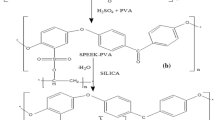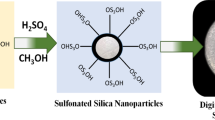Abstract
5 to 20 mol% hybrid inorganic organic porous silica (SO3H-Si) and polymer polytetrafluoroethane (PTFE) was mixed together to produce 10 to 300 μm thick membrane (S03H-Si-PTFE). Proton conductivity of resultant hybrid silica before and after mixing with PTFE determined in dry nitrogen and 100 % relative humidity (RH) using impedance spectroscopy. 20 % S03H-Si-PTFE shows proton conductivity up to 10–2 S/cm, similar to Nafion117 at room temperature at 100 % relative humidity. Membrane electrode assembly (MEA) was developed and used in direct methanol fuel cell technology. Power density of the MEA was 55 mW/cm2 at 40 °C. Materials were characterized using various instrumental techniques, such as ICP, XRD, TG-DTA, XPS, N2 sorption, 29Si and 13C MAS NMR, FT-IR, particle size analyzer and TDS.
Access this chapter
Tax calculation will be finalised at checkout
Purchases are for personal use only
Similar content being viewed by others
References
S. Hamoudi, S. Royer, and S. Kaliaguine; J. Micro. Meso. Mater. 71 (2004) 17.
S. Mikhailenko, D.D. Giscard, C. Danumah, and S. Laliaguine; J. Micro. Meso. Mater. 52 (2002) 29.
I. Diaz, C.M. Alvarez, F. Mohino, J.P. Pariente, and E. Sastre ; J. Micro. Meso. Mater. 44 (2001) 295.
Y. Mori, and T.J. Pinnavaia. Chem. Mater. 13 (2001) 2173.
D. Margolese, J.A. Melero, S.C. Christiansen, B.F. Chmelka, and G.D. Stucky; Chem. Mater. 12 (2000) 2448.
D. Isabel, M.A. Carlos, M. Federic, P.P. Joaquin and S. Enrique; J. Catal. 193 (2000) 283.
C.D. Wagner, W.M. Riggs, L.E. Devis, J.F. Moulder and G.E. Muilenberg; X-Ray photoelectron Spectroscopy. Perkin-Elmer, Eden Prairie, MN.), 1979.
M.H. Zong, Z.Q. Duan, W.Y. Lou, T.J. Smith and H. Wu; Green Chemistry. 9 (2007) 434.
Author information
Authors and Affiliations
Editor information
Rights and permissions
Copyright information
© 2012 Springer-Verlag Berlin Heidelberg
About this chapter
Cite this chapter
Mal, N., Hinokuma, K. (2012). Proton Conducting Membrane from Hybrid Inorganic Organic Porous Materials for Direct Methanol Fuel Cell. In: Khemani, L., Srivastava, M., Srivastava, S. (eds) Chemistry of Phytopotentials: Health, Energy and Environmental Perspectives. Springer, Berlin, Heidelberg. https://doi.org/10.1007/978-3-642-23394-4_43
Download citation
DOI: https://doi.org/10.1007/978-3-642-23394-4_43
Publisher Name: Springer, Berlin, Heidelberg
Print ISBN: 978-3-642-23393-7
Online ISBN: 978-3-642-23394-4
eBook Packages: Earth and Environmental ScienceEarth and Environmental Science (R0)




